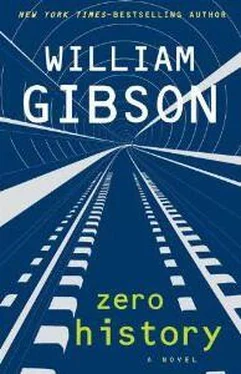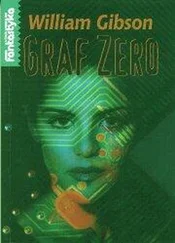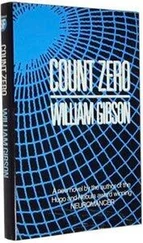William Gibson - Zero history
Здесь есть возможность читать онлайн «William Gibson - Zero history» весь текст электронной книги совершенно бесплатно (целиком полную версию без сокращений). В некоторых случаях можно слушать аудио, скачать через торрент в формате fb2 и присутствует краткое содержание. Жанр: Фантастика и фэнтези, на чешском языке. Описание произведения, (предисловие) а так же отзывы посетителей доступны на портале библиотеки ЛибКат.
- Название:Zero history
- Автор:
- Жанр:
- Год:неизвестен
- ISBN:нет данных
- Рейтинг книги:4 / 5. Голосов: 1
-
Избранное:Добавить в избранное
- Отзывы:
-
Ваша оценка:
- 80
- 1
- 2
- 3
- 4
- 5
Zero history: краткое содержание, описание и аннотация
Предлагаем к чтению аннотацию, описание, краткое содержание или предисловие (зависит от того, что написал сам автор книги «Zero history»). Если вы не нашли необходимую информацию о книге — напишите в комментариях, мы постараемся отыскать её.
Zero history — читать онлайн бесплатно полную книгу (весь текст) целиком
Ниже представлен текст книги, разбитый по страницам. Система сохранения места последней прочитанной страницы, позволяет с удобством читать онлайн бесплатно книгу «Zero history», без необходимости каждый раз заново искать на чём Вы остановились. Поставьте закладку, и сможете в любой момент перейти на страницу, на которой закончили чтение.
Интервал:
Закладка:
Everything she owned, currently, was here in this room. Aside from devalued money market shares, and some boxes of American author’s copies, back in the Tribeca Grand. She spat mouthwash into the marble sink.
Inchmale didn’t mind Bigend, not the way she did, but Inchmale, as formidably bright as she knew him to be, was also gifted with a useful crudeness of mind, an inbuilt psychic callus. He found Bigend interesting. Possibly he found him creepy, too, though for Inchmale, interesting and creepy were broadly overlapping categories. He didn’t, she guessed, find Bigend that utter an anomaly. An overly wealthy, dangerously curious fiddler with the world’s hidden architectures.
There was no way, she knew, to tell an entity like Bigend that you wanted nothing to do with him. That would simply bring you more firmly to his attention. She’d had her time in Bigend’s employ; while brief, it had been entirely too eventful. She’d put it behind her, and gone on with her book project, which had grown quite naturally out of what she’d been doing (or had thought she’d been doing) for Bigend.
Although, she reminded herself, fastening her bra and pulling on a T-shirt, the money she’d seen reduced by almost half had come to her via Blue Ant. There was that. She pulled a sheer black mohair sweater over the T-shirt, smoothed it over her hips, and pushed up the sleeves. She sat on the edge of the bed, to put on her shoes. Then back into the bathroom for makeup.
Purse, iPhone, key with its tassel.
Out, then, and past the identical follies in their different landscapes. To press the button and wait for the lift. She put her face close to the iron cage, to see the lift rise toward her, atop it some complex electromechanical Tesla-node no designer had even had to fake up, the real deal, whatever function it might serve. And decked, she always noted with a certain satisfaction, with a bit of frank slut’s wool, the only actual dust she’d yet seen in Cabinet. Even a few errant cigarette butts, the English being beasts that way.
And down, to the floor above the paneled foyer, where the night’s boozing and networking had left no evidence, and the serving staff, reassuringly immune to the long room’s decor, were about their morning business. She made her way to the rear, taking a seat at a place for two, beneath what might originally have been a gun rack in parquetry, but which now held half a dozen narwhale tusks.
The Italian girl brought her a pot of coffee, unbidden, with a smaller one of steamed milk, and the Times .
She was starting her second cup, Times unread, when she saw Hubertus Bigend mount the stairhead, down the full length of the long room, wrapped in a wide, putty-colored trench coat.
He was the ultimate in velour-robe types, and might just as well have been wearing one now as he swept toward her through the drawing room, unknotting the coat’s belt as he came, pawing back its Crimean lapels, and revealing the only International Klein Blue suit she’d ever seen. He somehow managed always to give her the impression, seeing him again, that he’d grown visibly larger, though without gaining any particular weight. Simply bigger. Perhaps, she thought, as if he grew somehow closer .
As he did now, breakfasting Cabineteers cringing as he passed, less in fear of his vast trailing coat and its dangerously swinging belt than out of awareness that he didn’t see them.
“Hollis,” he said. “You look magnificent.” She rose, to be air-kissed. Up close, he always seemed too full of blood, by several extra quarts at least. Rosy as a pig. Warmer than a normal person. Scented with some ancient European barber-splash.
“Hardly,” she said. “Look at you. Look at your suit.”
“Mr. Fish,” he said, shrugging out of the trench coat with a rattle of grenade-loops and lanyard-anchors. His shirt was palest gold, the silk tie knit in an almost matching shade.
“He’s very good,” she said.
“He’s not dead,” said Bigend, smiling, settling himself in the armchair opposite.
“Dead?” She took her seat.
“Apparently not. Just impossible to find. I found his cutter,” he said. “In Savile Row.”
“That’s Klein Blue, isn’t it?”
“Of course.”
“It looks radioactive. In a suit.”
“It unsettles people,” he said.
“I hope you didn’t wear it for me.”
“Not at all.” He smiled. “I wore it because I enjoy it.”
“Coffee?”
“Black.”
She signaled to the Italian girl. “How was the black metal?”
“Tremolo picking,” he said, perhaps slightly fretfully. “Double-kick drumming. Reg thinks something’s there.” He tilted his head slightly. “Do you?”
“I don’t keep up.” Adding milk to her coffee.
The Italian girl returned for their breakfast order. Hollis asked for oatmeal with fruit, Bigend for the full English.
“I loved your book,” he said. “I thought the reception was quite gratifying. Particularly the piece in Vogue .”
“ ‘Old rock singer publishes book of pictures’?”
“No, really. It was very good.” He tidied the trench coat, which he’d draped across the arm of his chair. “Working on something else now?”
She sipped her coffee.
“You want to follow that up,” he said.
“I hadn’t noticed.”
“Barring scandal,” he said, “society is reluctant to let someone who’s become famous for one thing become famous for another.”
“I’m not trying to become famous.”
“You already are.”
“Was. Briefly. And in quite a small way.”
“A degree of undeniable celebrity,” he said, like a doctor offering a particularly obvious diagnosis.
They sat silently, then, Hollis pretending to glance over the first few pages of the Times , until the Italian girl and an equally pretty and dark-haired boy arrived, bearing breakfast on dark wooden trays with brass handles. They arranged these on the low coffee table and retreated, Bigend studying the sway of the girl’s hips. “I adore the full English,” he said. “The offal. Blood pudding. The beans. The bacon. Were you here before they invented food?” he asked. “You must have been.”
“I was,” she admitted. “I was very young.”
“Even then,” he said, “the full English was a thing of genius.” He was slicing a sausage that looked like haggis, but boiled in the stomach of a small animal, something on the order of a koala. “There’s something you could help us out with,” he said, and put a slice of sausage in his mouth.
“Us.”
He chewed, nodded, swallowed. “We aren’t just an advertising agency. I’m sure you know that. We do brand vision transmission, trend forecasting, vendor management, youth market recon, strategic planning in general.”
“Why didn’t that commercial ever come out, the one they paid us all the money to use ‘Hard to Be One’ in?”
He dabbed a torn toast-finger into the runny yellow eye of a fried egg, bit off half of it, chewed, swallowed, wiped his lips with his napkin. “Do you care?”
“That was a lot of money.”
“That was China,” he said. “The vehicle the ad was for hasn’t made it to roll-out. Won’t.”
“Why not?”
“There were problems with the design. Fundamental ones. Their government decided that that wasn’t the vehicle with which China should enter the world market. Particularly not in the light of the various tainted food product scandals. And whatnot.”
“Was it that bad?”
“Fully.” He forked baked beans adroitly onto toast. “They didn’t need your song, in the end,” he said, “and, as far we know, the executives in charge of the project are all still very much alive. Quite an optimal outcome for all concerned.” He started on his bacon. She ate her oatmeal and fruit, watching him. He ate quickly, methodically topping up whatever metabolism kept him firing on those extra cylinders. She’d never seen him tired, or jet-lagged. He seemed to exist in his own personal time zone.
Читать дальшеИнтервал:
Закладка:
Похожие книги на «Zero history»
Представляем Вашему вниманию похожие книги на «Zero history» списком для выбора. Мы отобрали схожую по названию и смыслу литературу в надежде предоставить читателям больше вариантов отыскать новые, интересные, ещё непрочитанные произведения.
Обсуждение, отзывы о книге «Zero history» и просто собственные мнения читателей. Оставьте ваши комментарии, напишите, что Вы думаете о произведении, его смысле или главных героях. Укажите что конкретно понравилось, а что нет, и почему Вы так считаете.











